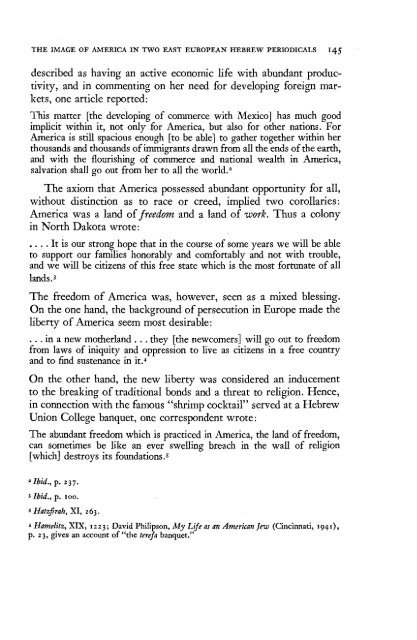American Tewish Archives - American Jewish Archives
American Tewish Archives - American Jewish Archives
American Tewish Archives - American Jewish Archives
Create successful ePaper yourself
Turn your PDF publications into a flip-book with our unique Google optimized e-Paper software.
THE IMAGE OF AMERICA IN TWO EAST EUROPEAN HEBREW PERIODICALS 14.5<br />
described as having an active economic life with abundant produc-<br />
tivity, and in commenting on her need for developing foreign mar-<br />
kets, one article reported:<br />
This matter [the developing of commerce with Mexico] has much good<br />
implicit within it, not only for America, but also for other nations. For<br />
America is still spacious enough [to be able] to gather together within her<br />
thousands and thousands of immigrants drawn from all the ends of the earth,<br />
and with the flourishing of commerce and national wealth in America,<br />
salvation shall go out from her to all the world.2<br />
The axiom that America possessed abundant opportunity for all,<br />
without distinction as to race or creed, implied two corollaries:<br />
America was a land of freedom and a land of work. Thus a colony<br />
in North Dakota wrote:<br />
. . . . It is our strong hope that in the course of some years we will be able<br />
to support our families honorably and comfortably and not with trouble,<br />
and we will be citizens of this free state which is the most fortunate of all<br />
lands.3<br />
The freedom of America was, however, seen as a mixed blessing.<br />
On the one hand, the background of persecution in Europe made the<br />
liberty of America seem most desirable:<br />
. . . in a new motherland . . . they [the newcomers] will go out to freedom<br />
from laws of iniquity and oppression to live as citizens in a free country<br />
and to find sustenance in it.4<br />
On the other hand, the new liberty was considered an inducement<br />
to the breaking of traditional bonds and a threat to religion. Hence,<br />
in connection with the famous "shrimp cocktail" served at a Hebrew<br />
Union College banquet, one correspondent wrote:<br />
The abundant freedom which is practiced in America, the land of freedom,<br />
can sometimes be like an ever swelling breach in the wall of religion<br />
[which] destroys its foundations.5<br />
Ibid., p. 237.<br />
3 Ibid,, p. loo.<br />
4 Hatzfirah, XI, 263.<br />
Hamelitz, XIX, I z z 3 ; David Philipson, My Life as an <strong>American</strong> Jew (Cincinnati, I g41),<br />
p. 2 3, gives an account of "the tereja banquet."

















